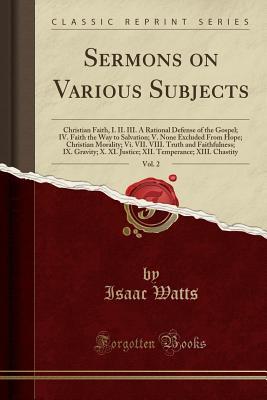- Bible
- Read the Bible
- Bible Versions
- Verse of the Day
- Reading Plans
- Verses by Topic
- Books of the Bible
- Bible Images
- Study
- Commentaries
- Concordances
- Dictionaries
- Encyclopedias
- Sermons
- Bible Atlas & Maps
- BP Wiki
- Devotionals
- Today's Devotionals
- Light of the World
- All Devotionals
- Inspirational Quotes
- More
- Picture Quotes
- Videos
- Inspirational
- Bible Study
- What The Bible Says
- Bible Q&As
- Daily Bread
- Bible by Genre
- Bible Stories
- Random Bible Verse
- Community
- Store
Excerpt from Sermons on Various Subjects, Vol. 2: Christian Faith, I. II. III. A Rational Defense of the Gospel; IV. Faith the Way to Salvation; V. None Excluded From Hope; Christian Morality; Vi. VII. VIII. Truth and Faithfulness; IX. Gravity; X. XI. Justice; XII. Temperance; XIII. Chastity
I. What the Gofitel of Chri/f is, that 'we may not miitakeit. II. What is included inzthis Exprcflion, [am not a/hain'a' of it. 111: What there is in this Gofpel that.
About the Publisher
Forgotten Books publishes hundreds of thousands of rare and classic books. Find more at www.forgottenbooks.comwww.forgottenbooks.com
This book is a reproduction of an important historical work. Forgotten Books uses state-of-the-art technology to digitally reconstruct the work, preserving the original format whilst repairing imperfections present in the aged copy. In rare cases, an imperfection in the original, such as a blemish or missing page, may be replicated in our edition. We do, however, repair the vast majority of imperfections successfully; any imperfections that remain are intentionally left to preserve the state of such historical works.
I. What the Gofitel of Chri/f is, that 'we may not miitakeit. II. What is included inzthis Exprcflion, [am not a/hain'a' of it. 111: What there is in this Gofpel that.
About the Publisher
Forgotten Books publishes hundreds of thousands of rare and classic books. Find more at www.forgottenbooks.comwww.forgottenbooks.com
This book is a reproduction of an important historical work. Forgotten Books uses state-of-the-art technology to digitally reconstruct the work, preserving the original format whilst repairing imperfections present in the aged copy. In rare cases, an imperfection in the original, such as a blemish or missing page, may be replicated in our edition. We do, however, repair the vast majority of imperfections successfully; any imperfections that remain are intentionally left to preserve the state of such historical works.
BUY NOW
Paperback, 488 pages
Published August 3rd 2018 by Forgotten Books
© 2025 Bibleportal.com All rights reserved.

Isaac Watts is recognised as the "Father of English Hymnody", as he was the first prolific and popular English hymnwriter, credited with some 750 hymns. Many of his hymns remain in active use today and have been translated into many languages.
His education led him to the pastorate of a large Independent Chapel in London, and he also found himself in the position of helping trainee preachers, despite poor health. Taking work as a private tutor, he lived with the non-conformist Hartopp family at Fleetwood House, Abney Park in Stoke Newington, and later in the household of Sir Thomas Abney and Lady Mary Abney at Theobalds, Cheshunt, in Hertfordshire, and at their second residence, Abney House, Stoke Newington.
Though a non-conformist, Sir Thomas practised occasional conformity to the Church of England as necessitated by his being Lord Mayor of London 1700-01. Likewise, Isaac Watts held religious opinions that were more non-denominational or ecumenical than was at that time common for a non-conformist, having a greater interest in promoting education and scholarship, than preaching for any particular ministry.
... Show more